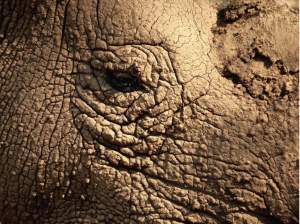By Michael Eustace (Investment analyst) [email protected].
The ban on rhino horn trade imposed by Cites in 1976 has been a miserable failure. All that the ban has achieved is to push trade underground where it has thrived and made money for criminals. Tens of thousands of rhino have been killed, unnecessarily.
Horn is in demand in the Far East where it has been used to treat various ailments for hundreds of years. Western medicine believes there are more effective remedies but the Chinese and Vietnamese have paid no attention to Western views and the price of horn has risen strongly. In South Africa, about 650 rhino will be poached in 2012. Add rhino that will be poached in the rest of Africa and horn taken in pseudo trophy hunts and the total supply will approximate 800 horns for the year. We can derive the level of demand from the supply numbers as demand and supply must be equal. They are brought into balance by the very high price of $60,000 per kg in the retail market.
South Africa has 20,000 white rhino and 2% die of natural causes each year. We could supply the market with 400 horns from natural deaths of white rhino alone. We also have large stockpiles of horn which have been accumulated over many years. We can supply another 400 horns p.a. from this stockpile for many years to come. We can actually satisfy the market demand, on a sustainable basis, without the need to kill one animal.
We do need to limit the horn market and a free for all market (widely assumed by the donor agencies) is not going to do that. There is a smart option. We need to establish a monopoly over all legal supplies by selling through a Central Selling Organization which would broker all legitimate horn to state pharmaceutical companies in China and Vietnam who, in turn, would retail horn through licensed outlets such as Traditional Chinese Medicine hospitals. Those state companies will be profitably invested in the legal trade and have the incentive and ability to either close down or limit the illegal trade.
Illegal goods of any nature typically trade at a 30% discount because of the fear of prosecution. Add the risk of fake horn and poisoned horn and the discount will be larger, say, 40%. The horn price has risen by 50% over the past year and 6 times over the past 10 years. This rapid increase in price will have attracted speculators who buy horn in the expectation of selling it at a later date at a profit. If speculation has been 25% of total demand and we can remove the speculators, the trade volume falls to 600 horns p.a. With large new legal supplies there will be little expectation for price appreciation and the speculators should become sellers and not buyers.
One horn sold from stocks should save one rhino in the wild.
Poachers will continue to operate but the number of rhino they kill will decrease. For the purposes of illustration it is suggested that the number of rhino poached will fall to 200 p.a., which the rhino population can tolerate. Those poached horns will be sold into the illegal
market at $36,000 and not $60,000 per kg. Lower prices, higher risks and limited volumes will make the illegal trade much less attractive.
SANParks and Ezemvelo support trade in horn from natural deaths and stocks, as do most South African rhino experts.
Law enforcement is vital but on its own is unlikely to win the war. We have seen this from the Kruger Park experience where, over the last year, anti-poaching effort has been increased substantially, and the army has deployed 100 troops along the Mozambique border and yet poaching is expected to increase by 60 %, from 252 rhino to 405.
The rewards to poaching are so high that corruption becomes inevitable and corruption undermines law enforcement.
The main objective of a legal trade is to stop the killing. However, in addition, there will be about R600 million p.a. that will be generated for parks and R200 million for private owners. Those profits will go into conservation rather than to criminals.
The ban has not been good conservation and it is senseless to continue with a strategy that has failed for 35 years, hoping for a different outcome. A smart trade is a much better plan.



